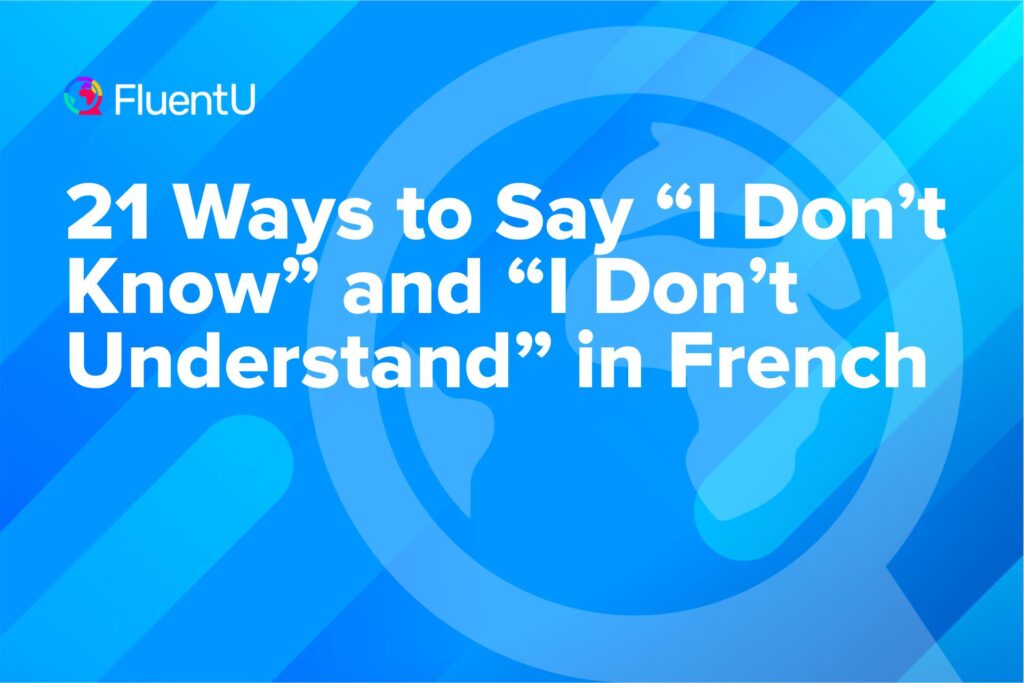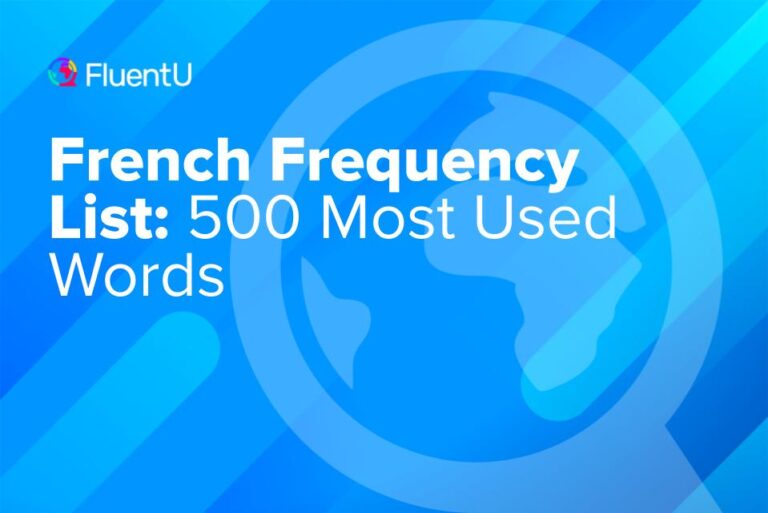Contents
- How to Say “I Don’t Know” in French
- 1. Je ne sais pas — I don’t know
- 2. Je n’en ai aucune idée — I have no idea
- 3. Je ne suis pas sûr — I’m not sure
- 4. Je ne saurais dire — I wouldn’t know
- 5. Chais pas — Dunno
- 6. Ça me dépasse — It’s beyond me
- 7. C’est un mystère pour moi — It’s a mystery to me
- 8. Ça m’échappe — It escapes me
- 9. Je ne suis pas au courant — I’m not aware
- How to Say “I Don’t Understand” in French
- 10. Je ne comprends pas — I don’t understand
- 11. Je ne saisis pas / Je pige pas — I don’t get it
- 12. Je pige que dalle — I don’t understand anything
- 13. Ça ne fait pas sens pour moi — It doesn’t make sense to me
- 14. Ça me semble obscur — It seems unclear
- 15. Je suis perdu — I am lost
- 16. Je n’arrive pas à suivre — I can’t keep up
- 17. Ça me laisse perplexe — I am puzzled by it
- 18. C’est du chinois pour moi — It’s Chinese to me
- 19. Je ne peux pas saisir le sens — I cannot grasp the meaning
- 20. Ça me laisse dans le brouillard — It leaves me in the fog
- 21. Ça me dépasse totalement — It totally surpasses me
- How to Say “I Don’t Understand French”
- More Phrases for Expressing Uncertainty in French
- And one more thing...
21 Ways to Say “I Don’t Know” and “I Don’t Understand” in French

You know how to say “yes” and “no” in French, but how about “I don’t know”? You may not always know the answer, and that’s okay.
Here are all the ways to respond when you need to say “I don’t know” ( Je ne sais pas ) or “I don’t understand” ( Je ne comprends pas ) in French without losing face.
Download: This blog post is available as a convenient and portable PDF that you can take anywhere. Click here to get a copy. (Download)
How to Say “I Don’t Know” in French
1. Je ne sais pas — I don’t know
This is the most common and straightforward way to say “I don’t know” in French. It’s used in practically all scenarios, in much the same way was “I don’t know” is used in English.
For example, if someone asks you a question and you don’t know the answer, you can simply say Je ne sais pas.
Note that in French negation, the word ne is often omitted when speaking out loud. In this case, you may simply say Je sais pas, especially in more casual situations.
2. Je n’en ai aucune idée — I have no idea
This is a more emphatic way of expressing ignorance or lack of knowledge. It’s used when you want to convey a stronger sense of not having any clue about a particular matter.
You can use it in a similar context as Je ne sais pas, but with a heightened emphasis on the absence of any idea or knowledge.
You can also shorten the expression to the quick and casual Aucune idée — No idea.
3. Je ne suis pas sûr — I’m not sure
Sometimes, the answer isn’t a clear “I don’t know,” but rather an uncertainty in the answer. In that case, use this expression.
For example, if someone asks for your opinion and you’re not completely confident in your thoughts on the matter, you can respond with Je ne suis pas sûr to express your uncertainty.
4. Je ne saurais dire — I wouldn’t know
This phrase literally translates to “I couldn’t say” and it’s used when you feel unable to provide a definite answer due to lack of knowledge or uncertainty.
You might use this phrase when you want to express that you’re not in a position to provide a definite answer to a particular question.
Another variation on this phrase is Je ne pourrais pas te dire — I couldn’t tell you.
5. Chais pas — Dunno
Chais pas is a colloquial and informal way of saying Je ne sais pas. The contraction Chais is often used in casual spoken language. This informal variant is often used in everyday conversations, generally among people you’re familiar with.
6. Ça me dépasse — It’s beyond me
Use this phrase when something is so difficult for you to comprehend that you just can’t make sense of it. It could express bewilderment or frustration when faced with a puzzling situation.
7. C’est un mystère pour moi — It’s a mystery to me
Similar to Ça me dépasse, use this expression when you’re completely baffled by something.
8. Ça m’échappe — It escapes me
Is the answer to something so elusive that it’s escaped your mind? This is the expression for that situation.
9. Je ne suis pas au courant — I’m not aware
More than just “I don’t know,” “Je ne suis pas au courant” is used to show a lack of awareness or familiarity with something. It implies that you might not have encountered or been informed about the particular topic, rather than a simple lack of knowledge.
How to Say “I Don’t Understand” in French
10. Je ne comprends pas — I don’t understand
This is the most common phrase to show that you’re unable to comprehend something. Whether something is confusing to you or you don’t know the vocabulary being used, use this expression to say so. This is an especially useful expression for new French language learners!
11. Je ne saisis pas / Je pige pas — I don’t get it
This is a more formal and slightly literary way of conveying a lack of comprehension. It’s a polite way to communicate that you’re having difficulty understanding something.
12. Je pige que dalle — I don’t understand anything
Completely at a loss? This phrase empasizes that you just don’t get anything. It’s quite casual so save this one for friends and informal settings.
13. Ça ne fait pas sens pour moi — It doesn’t make sense to me
When you just don’t get it, this expression is used to show your befuddlement and show that something doesn’t make sense to you.
14. Ça me semble obscur — It seems unclear
Sometimes, the lack of understanding isn’t your own fault and has more to do with the situation or explanation. Use this phrase to express that something is difficult to understand because of its lack of clarity.
15. Je suis perdu — I am lost
If you’re wandering around the streets of Paris and your GPS is on the fritz, you can use “Je suis perdu” to say that you are, quite literally, lost. But when it’s used figuratively, this phrase can mean “I’m confused” or “I don’t know what to do.”
16. Je n’arrive pas à suivre — I can’t keep up
This expression is used when you’re having trouble following along with a conversation or explanation. It can also literally mean that someone’s speaking too quickly for you to understand.
17. Ça me laisse perplexe — I am puzzled by it
Use this phrase to convey a sense of confusion about a particular situation, statement or information.
18. C’est du chinois pour moi — It’s Chinese to me
This is a colloquial expression used to convey that something is completely incomprehensible or unintelligible. It’s similar to the English expression “It’s Greek to me” and means that something’s so difficult to understand that it might as well be in a different language.
19. Je ne peux pas saisir le sens — I cannot grasp the meaning
Save this phrase for when the meaning of something is just out of your grasp, figuratively (or literally!).
20. Ça me laisse dans le brouillard — It leaves me in the fog
This phrase conveys an image of being lost in a fog, emphasizing the lack of clarity of something. You might use this phrase to express that something is unclear or ambiguous to you, leaving you with a sense of confusion or uncertainty.
21. Ça me dépasse totalement — It totally surpasses me
This expression is used to convey a strong sense of being unable to understand or cope with a situation. You might use it to express that something is entirely beyond your understanding.
How to Say “I Don’t Understand French”
Have something urgent to say or ask, and don’t want to spend any time stumbling through French? Use these expressions to let whoever you’re addressing know that you don’t understand French, or would prefer if they spoke English:
- Je ne comprends pas le français. — I don’t understand French.
- Excusez-moi, mais je ne parle pas bien le français. — Excuse me, but I don’t speak French well.
- Pardon, je ne saisis pas ce que vous dites. — Sorry, I don’t grasp what you’re saying.
- J’ai du mal à comprendre le français. — I have difficulty understanding French.
- Pouvez-vous répéter, s’il vous plaît ? Je n’ai pas compris. — Can you repeat, please? I didn’t understand.
- Pourriez-vous m’expliquer en anglais, s’il vous plaît ? — Could you explain in English, please?
- Parlez-vous anglais ? — Do you speak English?
You might find these phrases useful when you first start out, but as you learn more French, you should try to communicate in the language. You’ll find that most people are very understanding and patient with people who are learning their language!
You can also bolster your confidence and French skills by studying the language with the FluentU program.
FluentU takes authentic videos—like music videos, movie trailers, news and inspiring talks—and turns them into personalized language learning lessons.
You can try FluentU for free for 2 weeks. Check out the website or download the iOS app or Android app.
P.S. Click here to take advantage of our current sale! (Expires at the end of this month.)
More Phrases for Expressing Uncertainty in French
Still not sure about something and none of the above phrases quite fit the type of confusion that you’re afflicted with? Try these miscellaneous ways to express uncertainty:
- Ça m’est égal — It’s the same to me
- Je ne peux pas répondre à ça — I can’t answer that
- C’est au-dessus de mes compétences — It’s beyond my capabilities
- Je ne peux pas t’aider — I can’t help you
- Je ne maîtrise pas ce sujet — I haven’t mastered this subject
- Je ne peux pas affirmer — I can’t affirm
- C’est flou pour moi — It’s unclear to me
- Je ne saurais expliquer — I wouldn’t know how to explain
- Je ne vois pas le rapport — I don’t understand the relevance
- Ça me paraît confus — It seems confusing to me
- Je ne suis pas dans le coup — I’m not in the loop
- Je ne vois pas où tu veux en venir — I don’t understand your point
- Je n’y arrive pas — I can’t figure it out
There are still many things we don’t know, but at least now we know how to say “I don’t know” in French. And that’s an important skill to have!
And one more thing...
If you like learning French vocabulary on your own time and from the comfort of your smart device, then I'd be remiss to not tell you about FluentU.
Other sites use scripted content. FluentU uses a natural approach that helps you ease into the French language and culture over time. You’ll learn French as it’s actually spoken by real people.
FluentU has a wide variety of great content, like interviews and web series, as you can see here:

FluentU brings native videos within reach with interactive subtitles.
You can tap on any word to look it up instantly. Every definition has examples that have been written to help you understand how the word is used.

For example, if you tap on the word "crois," you'll see this:

Practice and reinforce all the vocabulary you've learned in a given video with FluentU's adaptive quizzes. Swipe left or right to see more examples for the word you’re learning and play the mini-games found in the dynamic flashcards, like "fill in the blank."

As you study, FluentU tracks the vocabulary that you’re learning and uses this information to give you a 100% personalized experience.
It gives you extra practice with difficult words—and reminds you when it’s time to review what you’ve learned.
Start using the FluentU website on your computer or tablet or, better yet, download the FluentU app from the iTunes or Google Play store. Click here to take advantage of our current sale! (Expires at the end of this month.)








